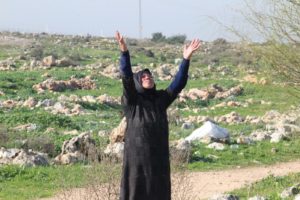After a five-kilometre walk from her home in the northern occupied West Bank, 49-year-old Khitam Ismail arrived on her plot of land at six in the morning, a routine she has maintained for years, and began to work.
Her constant cries over the recent loss of her beloved olive trees, which she has spent more than a decade growing, can be heard in the area.
‘I raised the trees as if they were my children’
– Khitam Ismail, farmer
On 6 December, Israeli bulldozers and dozens of army personnel raided the Khallet al-Abhar area in Deir Ballout, on the outskirts of the Palestinian city of Salfit, and carried out one of the largest tree uprooting operations to date in the West Bank, destroying 3,400 olive trees in one day.
According to officials in the local council, Israeli authorities also levelled hundreds of dunams of land with bulldozers in Area C, which residents fear comes in preparation for mass land confiscation in the village in the near future.
Four months earlier, in August 2020, the Israeli authorities issued a decision to confiscate the land under the pretext that it is “state land”. While landowners submitted a petition against the move accompanied with documents proving ownership, Israeli authorities carried out its decision before the Israeli judiciary made its final judgement.
Ismail had lost 750 olive trees in one day, but that did not deter her from returning to her land, and begin work from point zero.
A mother of three, Ismail told Middle East Eye that 15 years ago, she had rehabilitated about 35 dunams of her plot, planting it with olive trees.
“I did not receive a warning to stop farming or a land confiscation order during all those years. I put all I have in money and gold into this land,” she said.
“I raised the trees as if they were my children. Last year we were able to harvest and produce about ten tanks of olive oil.
“I was expecting to come out with 50 oil tanks this year, and that the land’s oil production would rise in the next five years to 400-500 oil tanks annually.”
Ismail’s family has become dependent on this land, extending across around 550 dunams, as the main source of income. She had hoped that, through her land’s yield, she would be able to send her three children to college.

